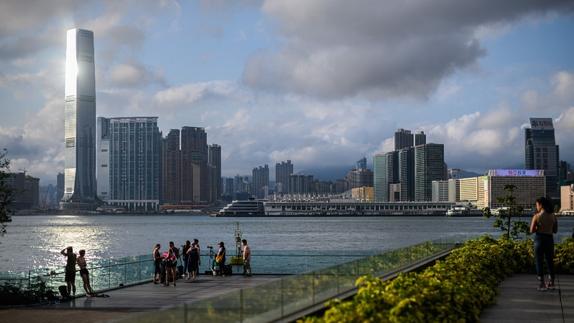 People gather to watch the sunset as they stand on a viewing platform in Tamar Park overlooking Victoria Harbour and the Kowloon skyline in Hong Kong on May 5, 2020. (ANTHONY WALLACE / AFP)
People gather to watch the sunset as they stand on a viewing platform in Tamar Park overlooking Victoria Harbour and the Kowloon skyline in Hong Kong on May 5, 2020. (ANTHONY WALLACE / AFP)
China's proposed national security legislation for Hong Kong will not only keep the city politically stable but also secure its standing as a global financial center, analysts said.
Analysts interviewed by China Daily said that the law-prohibiting acts of secession, subversion, terrorism and conspiracy with external forces-would adhere to the principle of "one country, two systems", instead of undermining it as claimed by some politicians in the United States and the United Kingdom.
Francis Chua, chairman emeritus of the Philippine Chamber of Commerce and Industry, said the security law would bring peace and order to Hong Kong, and also ensure the region's prosperity over the long term.
Anyone who supports Hong Kong's interest should welcome this law
Francis Chua, Chairman emeritus of the Philippine Chamber of Commerce and Industry
ALSO READ: China's US envoy: New security law will make HK safer place
Chua said the proposed legislation is in line with the "fundamental duty" of any government, which is to "safeguard its territory (and) to ensure the safety and well-being of its citizens".
Some activists have taken advantage of the lack of such a law to seek "Hong Kong independence" and resort to violent "revolution". An increase in terrorist acts, along with the arrests of suspects, has been seen over the past months.
"Anyone who supports Hong Kong's interest should welcome this law," Chua said.
Louis Kuijs, Asia head of the consultancy Oxford Economics, said that from China's perspective, "the national security law for Hong Kong is a purely an internal affair".
He said the Chinese government has ensured the principle of "Hong Kong people administering Hong Kong, with a high degree of autonomy" will be upheld for better practicing "one country, two systems".
Mustafa Izzuddin, an international affairs analyst with political consultancy Solaris Strategies Singapore, said the coming security law accords with China's Constitution and Hong Kong's Basic Law.
He said the law will give the central government more influence in the security affairs of Hong Kong and allow officials to "have a greater hold of the foreign interference in domestic politics in Hong Kong, which they felt is the reason behind the sociopolitical unrest in the recent past".
Wide support
On May 28, the National People's Congress agreed to proceed with a national security law for the Hong Kong Special Administrative Region. That decision has won support from almost 3 million people in the city.
The HKSAR has the legal responsibility to enact legislation in accordance with Article 23 of the Basic Law of the HKSAR and should complete the legislation to safeguard national security as soon as possible.
A day after the NPC vote paved the way for the law, US President Donald Trump announced the US would revoke Hong Kong's special trade status with Washington.
Aaron Jed Rabena, a researcher at the Manila-based foreign policy think tank Asia-Pacific Pathways to Progress, said Hong Kong has become "a great-power flashpoint" between the US and China.
Referring to Trump's announcement, he said it could "accelerate the China-US decoupling and intensify mutual hostile attitudes".
Kujis said that while higher tariffs and other barriers imposed against Hong Kong might hit bilateral trade, these actions "would not be a game changer".
"Hong Kong's trade with the US is only a modest share of its total trade. Around 8 percent of Hong Kong's exports now go to the US and this would not be a major setback," he said.
READ MORE: Security chief: Hong Kong preparing for new law
Kujis said the imposition of US tariffs and export restrictions would also affect other countries' trade flows that are routed through Hong Kong. But even then, he said its macroeconomic impact on Hong Kong is "unlikely to be really high".
Kujis also believes that Hong Kong will remain a major financial center, and will continue to attract international investors and asset managers.
Supporting this view, James Laurenceson, director of the Australia-China Relations Institute at the University of Technology Sydney, expects Hong Kong to remain a key business hub. "I don't see companies pulling out en masse (from Hong Kong). There will be a cost for sure, but I don't see it meaning the end of Hong Kong," he said.
Xinhua contributed to this story.


